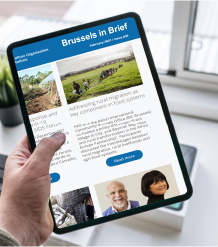Resources
Photos
Videos
Publications and Newsletters

Checklists and technical guidelines to combat illegal, unreported and unregulated (IUU) fishing
03/04/2024
This document is the third volume of a series of publications entitled Checklists and Technical Guidelines to Combat Illegal, Unreported and Unregulated (IUU) Fishing. This checklist provides a list of minimum requirements to ensure that the national MCS systems, operations, procedures and tools aimed at combating IUU fishing are of the desired standard to achieve the objectives of the fisheries management framework in place.

Compendium of forgotten foods in Africa
27/03/2024
The so-called forgotten food crops are nutritious, resilient and adaptable to local dietary practices. They thus offer a viable pathway to ensuring adequate food intake and dietary diversity, maintaining soil health, and achieving climate resilience amongst African farming communities. Mainstreaming forgotten foods in the daily diets of African communities should therefore be a core component of any attempts at sustainable food system transformation in the region.

The unjust climate
05/03/2024
This report assembles an impressive set of data from 24 low- and middle-income countries in five world regions to measure the effects of climate change on rural women, youths and people living in poverty. It analyses socioeconomic data collected from 109 341 rural households (representing over 950 million rural people) in these 24 countries.

Meeting the European Union's digital agriculture requirements: An ITU-FAO compendium for pre-accession countries and territories
04/03/2024
The ITU Office for Europe and the FAO Regional Office for Europe and Central Asia co-authored this document to serve primarily as a compendium supporting the entry of EU pre-accession countries to the EU single market and the alignment of their agricultural policies with the emerging EU legislation related to digital agriculture, and more specifically, the CAP and its delivery.

Measuring the state of food safety in Belgium with a food safety barometer
24/01/2024
This publication document discusses the development and implementation of a food safety barometer in Belgium. The purpose of the barometer is to measure the state of food safety in the country and enable evidence-informed risk management and policy decisions. The barometer relies on data collected from the control program of the Belgian Federal Agency for the Safety of the Food Chain (FASFC) and the National Reference Centre for Disease data.

Tackling antimicrobial resistance in food and agriculture
23/01/2024
This first report on FAO’s contribution to the global response to AMR outlines a wide range of activities undertaken by FAO at global, regional and country level. This report: describes FAO’s role in the global governance of AMR; provides an overview of progress on implementing national action plans on AMR in agrifood systems; and flags key challenges and opportunities related to AMR in the food and agriculture sectors.

Pathways towards lower emissions
11/12/2023
This FAO report presents a comprehensive global assessment of greenhouse gas emissions from livestock systems, utilizing FAO’s Global Livestock Environmental Assessment Model (GLEAM) based on the most recent available data. GLEAM also considers indirect emissions from upstream activities, such as feed and other inputs, and part of the downstream processes including post-farm transport, processing and packaging of raw products.

Agrifood solutions to climate change
01/12/2023
Amid a worsening climate crisis and slow progress in cutting greenhouse gases, sustainable agrifood systems practices can help countries and communities to adapt, build resilience and mitigate emissions, ensuring food security and nutrition for a growing global population. FAO is working with countries and partners from government to community level to simultaneously address the challenges of food security, climate change and biodiversity loss.

Previous newsletters
2024: January, February, April, May, June, July
2023: January, February, March, April, May, June, July, October, November
2022: January, February, March, April, May, June, July, September, October, November, December
2021: January, February, March, April, May, June, July, September, October, November, December
2020: January, February, March, April, May, June, July, September, October, November, December
2019: January, February, March, April, May, June, July, September, October, November, December
2018: April, May, June, July, September, October, November, December







f77f2ced-8484-4196-a923-4385333499fc.jpeg?sfvrsn=1d103f26_1)

